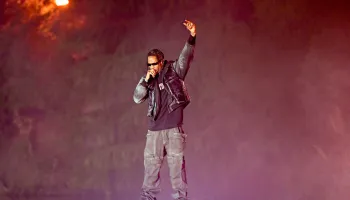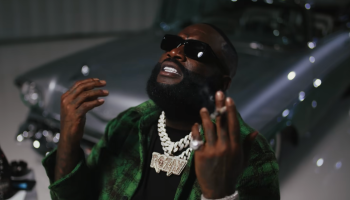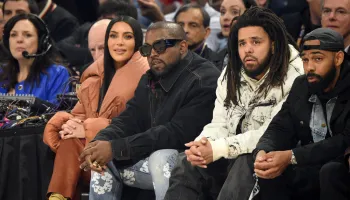Buju Banton returns to his roots on Rasta Got Soul, taking listeners on an illustrious musical journey that embodies the true essence of this internationally acclaimed DJ’s versatility. It’s a PURELY culture album, so certified dancehall fans – this one may not be for you! I’m talking Niyabinghi drums, Bobo dread chants, redemptive lyrics and then some.
Til Shiloh esque (1995) but then again not quite- Rasta Got Soul is a cleverly reworked traditional roots reggae collectable, stocked with spiritual life lessons and audaciously live music. No synthesized beats or mass-produced riddims on this joint! Sorry.
Buju’s been doing some serious soul searching since the release of his ferocious, Grammy nominated banger, Too Bad (2006)- We recently caught up with the Rasta mon, let’s see what’s on his heart…
HipHopWired: The last time we spoke was back in 06’ right before Too Bad dropped, what’s been going with you since then Buju?
Buju Banton: Just working hard in the studio here in Jamaica, trying to get these singles out. Going back to Africa, Europe and all dem places deh. Nothing major been doing…
HipHopWired: With this new album, you definitely return to the foundation of reggae music…the sound, the feel, the message, why do you feel like this project is important right now?
Buju Banton: Certain music have a time when it’s more relevant than others. I always try to make music that people can relate to, and I myself, living my experience, people living similar experience, and the music just speaks directly to it. People feel like dem alone but there are people out there seeing and going through similar struggles as you.
HipHopWired: Real talk… You’re inarguably the Godfather of this generation of reggae artists, who was the godfather of your generation and how did they influence you musically?
Buju Banton: Shabba Ranks and Major Worries were the godfather’s of my generation. You see, I Buju Banton, I don’t go around and tell people these things because I think it’s supposed to show and anybody who know the music should have knowledge of it. In the 90’s when I came into this game I brought competition and the whole rudiments of the music with me. I made songs with love and compassion that can still be played to this day. Now the rudiments have been adapted by many of the younger folks but they don’t know for what purpose because they’re not implementing it into the songs the way in which they should be. The moral of the music is dropping below standards.
HipHopWired: Do you feel like you’re reviving reggae music with this album?
Buju Banton: I am doing what I can for the music but I wouldn’t go so far and say I was reviving reggae music…
HipHopWired: What lies in the future for Reggae?
Buju Banton: We’re up musically and it’s weird. It come forward full circle, 360 degrees. That is why we’re laboring and we do not labor in Vain.
HipHopWired: Going into your lead single, “A Little Bit of Sorry,” an upbeat ska tune with a gracious message, what inspired you to revisit this particular sound?
Buju Banton: I find myself going sometimes on both sides of the music… you have people that love my dancehall contribution and people who love my reggae music contribution. The last album Too Bad was to satisfy those who are into the more dancehall side of Buju Banton, this record is more music that my reggae loving fans would look forward to.
HipHopWired: What’s the meaning behind the title, Rasta Got Soul?
Buju Banton: Well right now I & I going through a soulful time. It’s an actual fight against the spiritual, not against flesh and blood, but spiritual wickedness, yes? So you hafi have a soul. You hafi have moral conviction to do what you do. And you hafi make it different from what else is happening around you and what others are doing. One of my philosophies is, if the foundation is not rooted in spirituality whatever you’re doing must crumble because there is no conviction.
HipHopWired: The album’s signature song “Magic City” is an ode to Jamaica, what makes Jamaica such a mystical place?
Buju Banton: Jamaica hold a spiritual realm and to me it will always be on top. The whole Island is just so magical…
HipHopWired: Do you feel like you’ve fulfilled your musical destiny Buju?
Buju Banton: Noooo. The destiny is yet to fulfill. I’m still on the path to fulfilling my destiny musically and otherwise.
HipHopWired: Let’s talk about the derivation of “I Rise” and “Optimistic Soul…”
Buju Banton: I Rise from the concrete…Haahaa… “I Rise” talks about where Buju Banton is coming from, my journey through life. Yes. And “Optimistic Soul” deal wid me looking out into society and seeing where people heading in the hands of man. I am an optimist, hoping corrupt artistry can turn back round and people become human ting once more.
HipHopWired: So you don’t feel like people are in their human state right now?
Buju Banton: So much things is happening and it’s taking that away from us, slowly, surely, evidently!
HipHopWired: “Bedtime Story” featuring Wyclef, speaks about the serious impact the War in Iraq is having on children. Do you hope this ballad will transform peoples minds… ignite change?
Buju Banton: I hope so. I sincerely do hope so. Every song I do and everything I contribute to the realm of music I hope will promote some sort of change in the world. You see, “Daddy won’t be coming home tonight… cuz he got gunned down in a fight…” What kind of fight was he gunned down in? That question lingers. The focal point of the song is, someone, somewhere, out there tonight won’t be there singing…
Real music come fi teach us a lesson; it’s the only thing that will never get stale and die! It’s the only thing we will never get tired of listening to. When the music come to that point, it’s not music anymore it’s a hustle. Music is something you supposed to hear and every time you hear it, it sound like it was just made yesterday.
HipHopWired: Who is Buju Banton listening to today?
Buju Banton: I listen to the wind… to the waves, the birds flying high up above because these days, these things I am more interested in listening to rather than the words of man.
HipHopWired: How long do you see yourself creating music?
Buju Banton: I do not put a time on music because music knows no time. Knows no hour and in the future you feel no pain…it is invisible so it hafi infinite, just like our God, you hear it but you cannot see it. I am a servant of his and after that I am no more.















